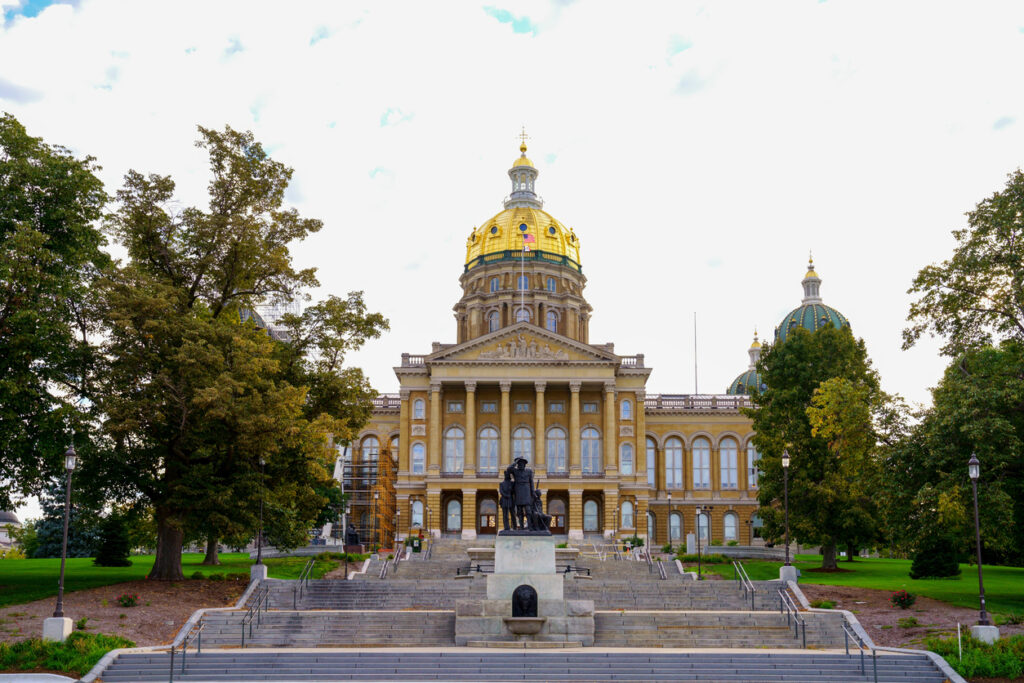
DES MOINES, Iowa (BP) – Iowa Gov. Kim Reynolds signed the Religious Freedom Restoration Act (RFRA) in a ceremony Tuesday night (April 2). The legislation is similar to the federal act signed by President Bill Clinton in 1993. More than half of U.S. states have passed their own versions of the law since 1997.
“Thirty years ago, the Religious Freedom Restoration Act passed almost unanimously at the federal level,” Reynolds said in a statement. “Since then, religious rights have increasingly come under attack. Today, Iowa enacts a law to protect these unalienable rights – just as twenty-six other states have done – upholding the ideals that are the very foundation of our country.”
The law states that state action “shall not substantially burden a person’s exercise of religion, even if the burden results from a rule of general applicability.” The only exceptions are cases in which the state can demonstrate “a compelling governmental interest” and the state must use “the least restrictive means of furthering that compelling governmental interest.”
Tim Lubinus, executive director of the Baptist Convention of Iowa, attended the signing ceremony for the law. He told Baptist Press the law’s “strict scrutiny” (i.e., requiring the state to prove a “compelling interest” in order to violate a person’s rights) is what makes it important.
It means “people like health care providers or people who have traditional Christian beliefs of marriage aren’t forced to act outside of their conscience,” Lubinus said.
He mentioned an example given at the signing ceremony in which the owners of a wedding venue declined to provide an LGBT marriage ceremony because of their religious convictions.
The couple had any number of other venues to choose from but approached the venue in question “just to create an issue,” Lubinus said.
The venue was forced to close as a result.
Lubinus said that example provided a “real and practical situation where hopefully this legislation would have helped.”
He also cited cases he knows in Iowa when proper accommodations were not given to health care workers who did not wish to provide certain services against their conscience.
In a post on X, Ethics & Religious Liberty Commission President Brent Leatherwood called the RFRA a “big win for Iowa Baptists and for everyone in the Hawkeye State.”
Such laws have been a priority for the ERLC’s involvement in state legislatures.
In comments to Baptist Press last month, ERLC policy director Hannah Daniel said religious liberty protections are increasingly necessary.
“At a time where many of our deepest held beliefs are viewed as intolerant or unpopular,” Daniel said, “these bills provide vital protections to people of faith living out those convictions in the public square.”
Alliance Defending Freedom attorney Greg Chafuen, said the RFRA provides a “sensible balancing test for courts to use when reviewing government policies that infringe upon the religious freedom rights of Iowans.
“The law doesn’t determine who will win every disagreement,” Chafuen said in a statement, “but it does ensure that every Iowan – regardless of their religious creed or political power – receives a fair hearing when government action forces a person to violate his or her religious beliefs.”
Lubinus said the law’s adoption is a bright spot for Christians in his state.
“That the legislature and the governor were able to act responsibly and courageously in order to provide these protections is an encouragement for our churches and other believers in Iowa,” he said.















